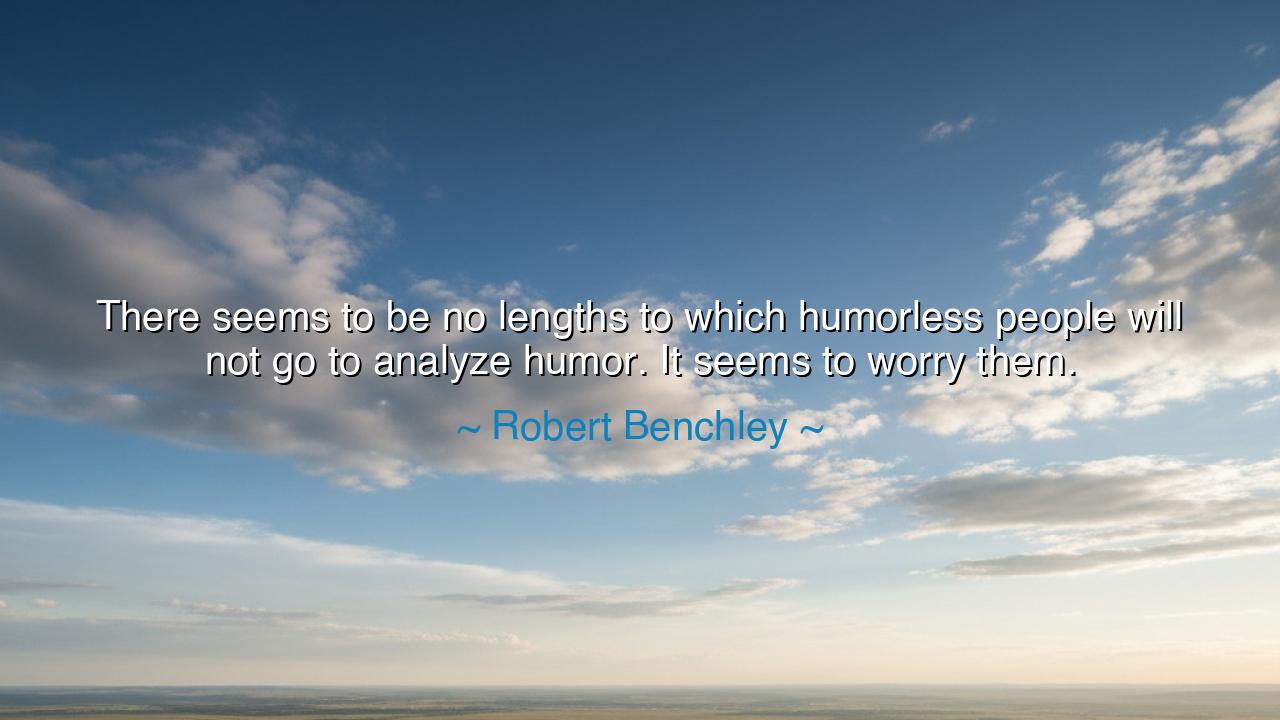
There seems to be no lengths to which humorless people will not
There seems to be no lengths to which humorless people will not go to analyze humor. It seems to worry them.






In the days when words were still seen as vessels of truth and laughter was considered a divine spark, the sage Robert Benchley spoke these words: “There seems to be no lengths to which humorless people will not go to analyze humor. It seems to worry them.” These words, though wrapped in wit, bear the weight of an ancient warning. For in them lies the eternal struggle between the spontaneity of joy and the rigidity of intellect, between the heart that laughs and the mind that seeks to dissect laughter as though it were a corpse upon the scholar’s table.
In every age, there are those who cannot abide mystery. They must measure the light of the sun, but never feel its warmth; they must chart the melody of a song, yet never hear its music. To such souls, humor is a puzzle to be solved, not a gift to be received. They look upon laughter not as a bridge between spirits, but as an error in logic to be corrected. Yet laughter, that sacred flame, refuses to be contained. It is the language of the gods and the cry of mortals who glimpse eternity and dare to mock their own insignificance. Benchley saw this truth: that the humorless fear laughter because it reminds them of their own confinement—because to laugh is to surrender control.
Consider the story of Diogenes the Cynic, that ragged philosopher of Greece, who mocked kings and scholars alike. When Plato defined man as a “featherless biped,” Diogenes plucked a chicken, brought it into the academy, and said, “Behold! Plato’s man!” The hall erupted in laughter, for truth often hides behind jest. Yet there were many who frowned, who whispered that such behavior was unphilosophical. They missed the deeper light—Diogenes’ laughter was not mockery for its own sake, but a weapon against pretense. He was teaching through absurdity what solemn minds could not grasp through words alone. Thus, humor became revelation, and those who refused to laugh were left outside the temple of understanding.
The humorless, in their pursuit of purity and reason, commit a subtle blasphemy: they forget that joy is sacred. To them, the universe must be ordered, predictable, defined. But laughter is the thunderbolt that breaks such illusions. It reminds us that the divine cannot be fully named, that truth often dances in disguise. Those who analyze humor as one might dissect a butterfly forget that the act of cutting destroys the very life they wish to comprehend. The more they study it, the further they drift from the warmth of the human soul.
Even in our own time, one may see this in the halls of learning and debate, where scholars write endless tomes explaining why a joke is funny—yet in all their pages, not a single laugh is born. Meanwhile, a child on the street giggles at the sight of a puppy tumbling over its own paws, and in that giggle lies more wisdom than in all the scholar’s ink. The heart, not the intellect, is the true home of humor. To laugh is to say, “I am alive; I am not afraid.” The humorless do not laugh because they fear surrendering the illusion of mastery.
So, let this be a lesson for the generations: guard your laughter as you would guard your spirit. Do not overanalyze what was meant to be felt. When mirth comes to you, let it rise like spring water—pure, untamed, and healing. Do not question it as though it were a stranger at your door. Let it enter, and it will refresh your soul.
To live wisely, one must balance thought and joy. Think deeply, yes, but laugh freely. Seek knowledge, but never let it harden your heart. When you find yourself tempted to analyze what is meant to delight you, remember Benchley’s words and pause. Ask instead: “Can I still laugh with wonder?” For the one who can laugh with sincerity has kept alive the light of the divine within him.
Thus, children of tomorrow, remember: laughter is the music of freedom. Cherish it, share it, defend it from the chill of overthinking. For when men cease to laugh, the soul grows silent—and a silent soul forgets how to live.






AAdministratorAdministrator
Welcome, honored guests. Please leave a comment, we will respond soon